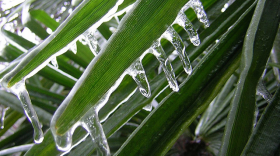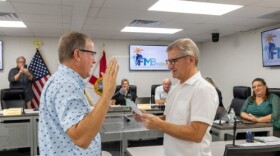Following a court-ordered agreement, the U.S. Fish and Wildlife Service has designated more than 1.1 million acres of critical habitat for the endangered Florida bonneted bat.
The indigenous bat faces devastating habitat loss from sea-level rise and destructive development.
While the designation was critical for the species' survival, the area marked is 21 percent smaller than the 1.5 million acres proposed by the federal agency in 2020.

Named for the broad ears that hang over their foreheads, bonneted bats are the largest of Florida’s 13 bat species and the second largest in North America. The bats roost in old tree cavities and artificial structures and forage for insects over open spaces like wetlands and fresh water. They also use one of the lowest-frequency echolocation calls of all bats, so some people are actually able to hear the bonneted bats’ bird-like chirps as they hunt for insects.
Florida bonneted bats have one of the smallest ranges of any bat species. They live only in South Florida including — an area that’s highly susceptible to rising sea levels and destructive development. Projections indicate that sea levels will rise between 3 and 6 feet within much of the bats’ habitat over the course of this century.
In the final designation announced recently, the Service clarified that essential foraging areas in urban critical habitat units are protected under the rule. The Service also explained that habitat with sufficient darkness is essential to the conservation of the Florida bonneted bat and noted that minimizing the use of artificial light and facilitating controlled burns may benefit Florida bonneted bats.
“I’m happy that Florida’s unique bats finally have protection for some of their most important habitat,” said Ragan Whitlock, a Florida-based attorney at the Center for Biological Diversity. “The Service correctly recognized that dark, open foraging spaces in urban Miami-Dade County are essential to this species’ survival. I applaud the Service for safeguarding this amazing bat’s remaining habitat that persists amid a sea of destructive development.”
"This is a much welcomed, albeit delayed, action by the Service,” said Dennis Olle, president of the Miami Blue Chapter of the North American Butterfly Association. "This critical habitat designation for one of North America’s rarest bats, provides an umbrella of protection for all species living thereunder.”
Encroaching development and pesticide use nearly drove Florida bonneted bats extinct before litigation filed by the Center compelled the Service to protect the bat under the Endangered Species Act in 2013. Conservation groups sued in 2018 and again in 2022 to secure habitat safeguards for the species.
Today’s critical habitat designation is the result of the 2022 lawsuit by the Center, Tropical Audubon Society and the Miami Blue Chapter of the North American Butterfly Association.
Although the proposal acknowledged the bats and their habitat are threatened by climate change and sea level rise, the Service did not extend badly needed protections for unoccupied critical habitat.
“We are glad to see that the Service has finally established habitat protections for this species, including more than 4,000 acres in the globally critically imperiled Miami pine rocklands,” said Lauren Jonaitis, senior conservation director at Tropical Audubon Society. “However, we still have major concerns that the Service failed to include unoccupied critical habitat to bolster against habitat loss from impending sea-level rise.”
Unfettered development and irresponsible development continue to threaten remaining Florida bonneted bat habitat.
A proposed theme park, retail and parking development recently threatened their critical habitat. This dark, open space next to Zoo Miami is recognized as the most important foraging ground for the largest known population of Florida bonneted bats.
Plans for the Miami Wilds theme park were halted in December after the Center, Bat Conservation International, Tropical Audubon Society and the Miami Blue Chapter of the North American Butterfly Association secured a legal victory for the species.
“Based on the current threats to this endangered species, we are thrilled that the Florida bonneted bat critical habitat designation has been published,” said Melqui Gamba-Rios, Ph.D., regional director for Latin America and Caribbean for Bat Conservation International. “It is reassuring the Service listened to extensive public comments and incorporated the most recent scientific findings when publishing this critical habitat designation. This is an integral tool for promoting the recovery and long-term protection of endangered species, and we look forward to working with the Service to develop and implement the Florida bonneted bat recovery plan.”
Animals with federally protected critical habitat are more than twice as likely to be moving toward recovery than species without such protections. Federal agencies that fund or permit projects in critical habitat are required to consult with the Service to ensure this habitat is not harmed or destroyed by their actions.
WGCU is your trusted source for news and information in Southwest Florida. We are a nonprofit public service, and your support is more critical than ever. Keep public media strong and donate now. Thank you.







